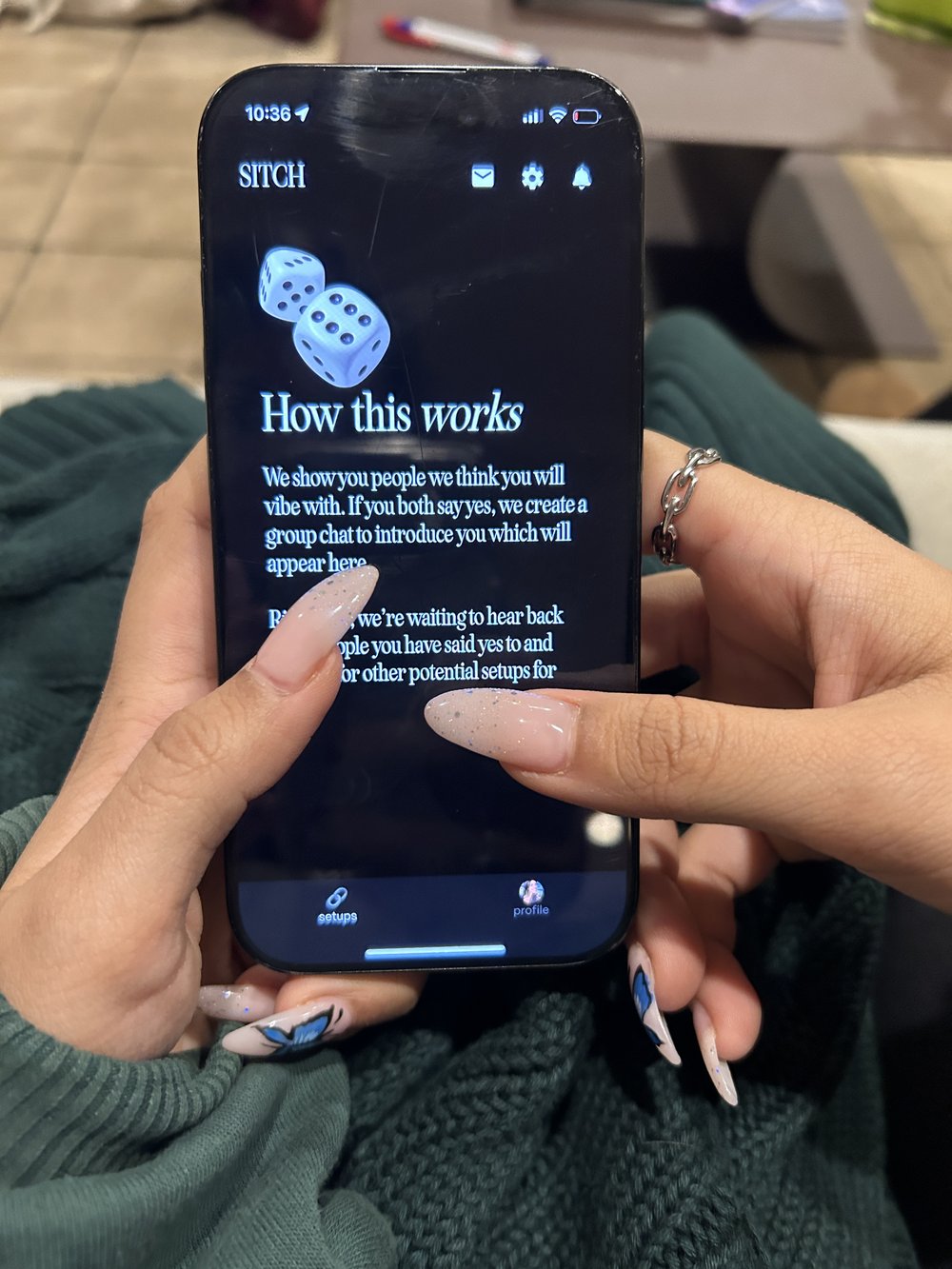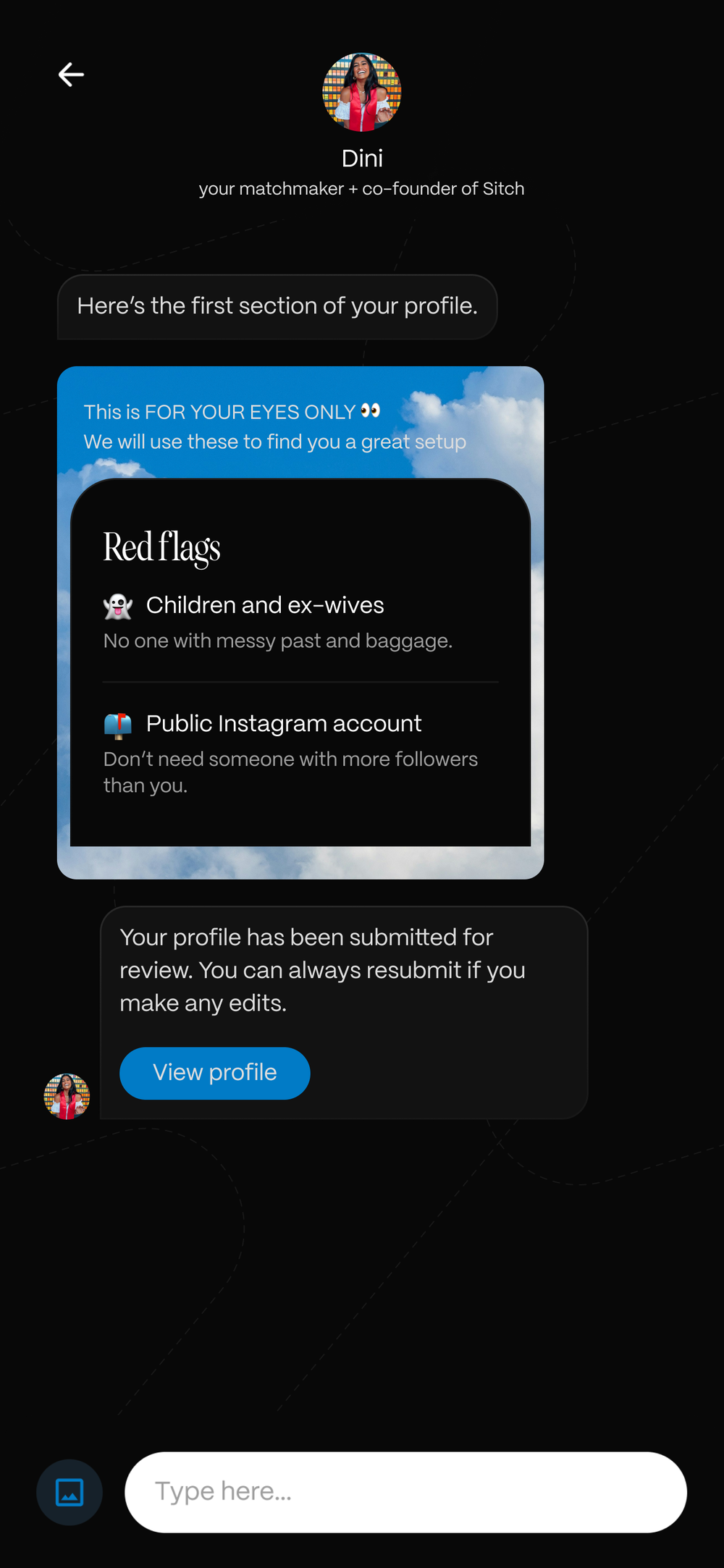For the perfect dating profile, some New Yorkers are letting AI do the work
Feb. 6, 2025, 6:31 a.m.
“The only solution is when you have somebody — or something — searching for you, and it understands your taste almost better than you do.”

For New Yorkers tired of scrolling online for dates, several new start-ups offer an enticing solution: Stop swiping, sit back, answer some personal questions and let artificial intelligence find your match.
Thousands of romantics in the city are turning to New York-based start-ups such as Sitch, Lara or Teleport in the hopes that one might help them find true love. Each platform shares a common mission: quality over quantity, identified with the help of AI.
While many major dating apps now utilize some form of AI – Tinder, for example, can help users pick photos, Hinge can help identify a match and Bumble has announced plans to expand its use of AI – these newer companies are focused on what could be called AI-powered concierge services. They each offer digital aids that help users write their profiles, identify their hearts' desires and then sort through seemingly endless lists of potential partners.
“If I were to see someone on Hinge, I might think about them for half a second,” said Suraya Shivji, a developer. She said the experience of being confronted with so many options so quickly felt “meaningless.”
She found that Sitch, a members-only, AI-powered matchmaking platform, made dating more intentional because “you get to know one match and you actually have to think about it.”
Nandini Mullaji and ex-Snapchat engineer Chad DePue started Sitch in November 2024. It sends users AI-curated matches, which are approved by human matchmakers. Teleport, another members-only platform that sends users one "proposed" match at a time, was launched in mid-2023 by TikTok relationship guru Chad Goodman.
There’s also Lara, newly available to download but still in early phases, and Iris, created in 2019 by computer scientist Igor Khalatian with the idea that the most critical part of a successful match is immediate facial attraction.
“If the strong mutual attraction is one in a million, that means that you need to swipe 1 million profiles to find that one in a million match,” he said. The only solution, he said, "is when you have somebody — or something — searching for you, and it understands your taste almost better than you do.”
‘Something new that wasn't more or less swiping, then messaging, then praying’
Each app also welcomes users with an AI assistant. Iris has is namesake AI: a startlingly realistic computer-generated brunette there to “help you find your perfect match.” “Lara” appears as a floating purple sphere and speaks in a calming voice. Sitch users get a message from a digital version of Mullaji, the app's co-founder.
“Tell me about where you work,” she says in the chat. “You can even include your income if you want (just kidding).”
Sitch users must first answer a series of deeply personal questions. “Should you sleep with someone on a first date?” Or “can you make it work after a partner cheats?” Then, the AI and a human matchmaker analyze a user's preferences and curate a personal list of matches, who are sent one at a time.
Need help asking them out? Users can describe their matches and Sitch's AI responds with tailored pickup lines. If a match is someone interested in filmmaking, for instance, it spits out, “Are you a camera? Because every time I look at you I smile!” Users can also direct it to offer "less cheesy" options, or anything else they want.
“I got really excited by something new that wasn't more or less swiping, then messaging, then praying,” said Barry Goldsmith, who has used Sitch for a couple of months.
Other apps have similar processes for generating dating profiles. Lara invites users to share past relationship experiences, while Teleport questions everything from a user's current diet to your life motto to their “lowest depth of misery.”
Some users say they appreciate a formula that regards them as a whole person, rather than a list of attributes.
“I'm a shorter guy,” said Goldsmith, who’s been on multiple dates through Sitch. “I'm 5-foot-6 on a good day. What I like about Sitch is that my height is a factor among 50 or 60 other factors, as opposed to maybe nine.”

Despite the fact that AI is meant to maximize efficiency, with these apps it can take days or even weeks to get matches, compared to others where users can match with someone in seconds.
And that’s assuming a user is accepted into the app in the first place. Users must apply to Teleport, Sitch and Lara, with the acceptance process taking as long as three weeks for some services.
The services are relatively pricey compared to apps like Hinge, Tinder and Bumble, which all offer free versions. Teleport's membership requires users to pay for three months, at $111 a month. Sitch is $125 for five setups. Iris is the cheapest option: Users can try it at no cost, but they’ll soon be prompted to find their one and only through the AI “super search,” which ranges from $5 to 13 per month.
‘With any dating app, you’re pretending to be a version of yourself that you think will get you a first date’
Despite worries over the blurred lines between AI and humans, or even anxieties that tech will take over for people, many young New Yorkers say these aren't concerns in their dating lives.
“With any dating app, you’re pretending to be a version of yourself that you think will get you a first date,” Goldsmith said. “That’s not anything new. Today, we’re just using AI to help us do it.”
“I think people are nervous about the idea of this omniscient being that knows and does everything,” Mullaji said. “We’ve all watched Westworld. But AI is really just a tool that is allowing people to scale their processes and time.”
Dr. Anasse Bari, a director at NYU’s AI Lab, said he isn’t surprised by the number of sign-ups.
“Young people are increasingly open to AI-powered dating apps, especially in big cities like NYC, where busy, career-focused lifestyles make fast and efficient matchmaking more appealing,” he said.
Bari said these apps “mitigate the phenomenon of digital exhaustion” by streamlining the search process, but still urged caution.
"Much like in health care, where AI serves as a decision-support tool while doctors make the final diagnosis, AI in dating should assist but not replace human intuition and decision-making," Bari said.
11 completely free things to do in New York City this February You can buy a mini-village in upstate NY built from junk and found objects